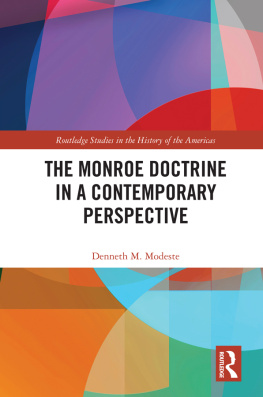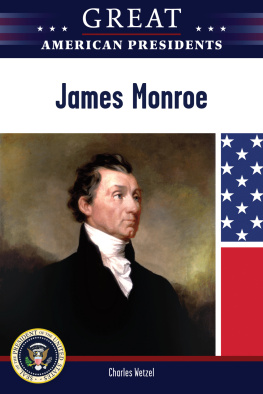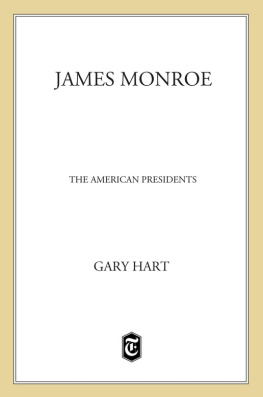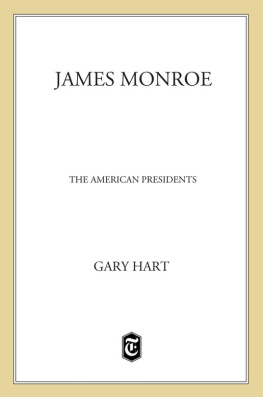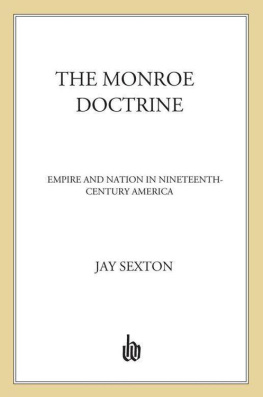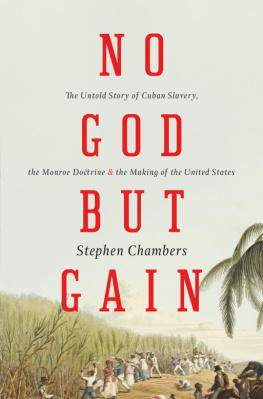The Monroe Doctrine in a Contemporary Perspective
This book surveys the impact of the Monroe Doctrine on United States relations with Latin America, with a particular focus on the Caribbean Basin, since its proclamation in 1823. It explores the historical role of the Monroe Doctrine as the instrument to foreclose future European colonial adventures in the American hemisphere and to exclude from it any political system(s) deemed to be incompatible with the American political tradition. Modeste examines the elastic interpretations of the Monroe Doctrine to justify American territorial expansion and imperial ambitions, premised on a strategic question the power controlling the Latin American/Caribbean trade routes and Sea Lines of Communication. Fundamental to the narrative is the linkage of the tenets of the Monroe Doctrine to contemporary local/regional crises where governments have applied extraordinary, extra-constitutional measures to exercise control or achieve political ends, mechanisms of peaceful conflict resolution fail, and subversive elements use unorthodox methods to threaten the integrity of the state. Modeste also traces the transformation of the Monroe Doctrine from a unilateral policy declaration to a multilateral compact for the collective defence of the hemisphere.
Denneth M. Modeste has served as a Grenada public official, parliamentarian, cabinet minister and Ambassador of Grenada to several countries, as well as a multilateral practitioner of the Organisation of American States. He is a graduate in international studies and international relations from the City College of New York and Cambridge University in England.
Routledge Studies in the History of the Americas
Negotiating Freedom in the Circum-Caribbean
The Jamaican Maroons and Creek Nation Compared
Helen M. McKee
The Missile Crisis from a Cuban Perspective
Historical, Archaeological and Anthropological Reflections
Hkan Karlsson and Toms Diez Acosta
Science and Society in Latin America
Peripheral Modernities
Pablo Kreimer
Traces and Memories of Slavery in the Atlantic World
Edited by Lawrence Aje and Nicolas Gachon
Transnational Perspectives on the Conquest and Colonization of Latin America
Edited by Jenny Mander, David Midgley and Christine D. Beaule
The Global Perspective of Urban Labor in Mexico City, 19101929
El Mundo al Revs
Stephan Fender
The Last Year of President Kennedy and the Multiple Path Policy Toward Cuba
Hkan Karlsson and Toms Diez Acosta
The Monroe Doctrine in a Contemporary Perspective
Denneth M. Modeste
For more information about this series, please visit: www.routledge.com/Routledge-Studies-in-the-History-of-the-Americas/book-series/RSHAM
The Monroe Doctrine in a Contemporary Perspective
Denneth M. Modeste

First published 2020
by Routledge
52 Vanderbilt Avenue, New York, NY 10017
and by Routledge
2 Park Square, Milton Park, Abingdon, Oxon, OX14 4RN
Routledge is an imprint of the Taylor & Francis Group, an informa business
2020 Taylor & Francis
The right of Denneth M. Modeste to be identified as author of this work has been asserted in accordance with sections 77 and 78 of the Copyright, Designs and Patents Act 1988.
All rights reserved. No part of this book may be reprinted or reproduced or utilised in any form or by any electronic, mechanical, or other means, now known or hereafter invented, including photocopying and recording, or in any information storage or retrieval system, without permission in writing from the publishers.
Trademark notice: Product or corporate names may be trademarks or registered trademarks, and are used only for identification and explanation without intent to infringe.
Library of Congress Cataloging-in-Publication Data
Names: Modeste, Denneth M., 1954 author.
Title: The Monroe Doctrine in a Contemporary Perspective / Denneth M. Modeste.
Description: New York, NY : Routledge Taylor & Francis Group, 2020. | Series: Routledge Studies in the History of the Americas; Volume 12 | Includes bibliographical references and index.
Identifiers: LCCN 2019049138 (print) | LCCN 2019049139 (ebook) | ISBN 9780367370985 (hardback) | ISBN 9780429352669 (ebook) | ISBN 9781000034479 (adobe pdf) | ISBN 9781000034486 (mobi) | ISBN 9781000034493 (epub)
Subjects: LCSH: Monroe doctrine. | United StatesForeign relationsLatin America. | Latin AmericaForeign relationsUnited States. | United StatesForeign relations.
Classification: LCC JZ1482 .M63 2020 (print) | LCC JZ1482 (ebook) | DDC 327.7308dc23
LC record available at https://lccn.loc.gov/2019049138
LC ebook record available at https://lccn.loc.gov/2019049139
ISBN: 978-0-367-37098-5 (hbk)
ISBN: 978-0-429-35266-9 (ebk)
Typeset in Sabon
by Apex CoVantage, LLC
To the memory of Jane-Ann Modeste
Contents
.
.
This book examines the impact of the Monroe Doctrine on American foreign relations and diplomatic practice in relation to the Caribbean Basin since its proclamation on December 2, 1823. Amid competing claims to rights and interests of European powers and the United States to territory on the North American continent, and in the context of widespread political agitation in Europe, fuelled primarily by the phenomenon of revolution and the revolutionary ideology, the United States sought, in one bold foreign policy instrument, to challenge the territorial claims of the extra-hemispheric powers and to shield the American hemisphere from their autocratic political systems of governance. In the doctrine which bore his name, President James Monroe declared in his Annual Message to the United States Congress in 1823 that movements by the European powers on any of those interrelated fronts would be interpreted as the manifestation of an unfriendly disposition towards the United States.
Many succeeding administrations adopted the notion that the doctrine sanctioned or even imposed an obligation to intervene in any state in the hemisphere that showed revolutionary tendencies and that failure to do so would amount to a negation or abdication of American leadership. Essentially, the Americans sought substitution of traditional diplomacy for a new form of international behaviour premised on what justified interference or not in internal disputes. Thus, the United States assumed the right to crush revolutions, by armed intervention if necessary, in the interest of the American political tradition.
In the aftermath of the Second World War, the leading powers sought to dissociate themselves from the antique practice of intervention in other states (singularly or jointly contrived) by outside powers in favour of handling international problems by international (primarily diplomatic) methods. Their idea/ideal was at its high-water mark in the launching of the UN system that accorded importance to the principle of sovereign equality of states. This new approach evolved in the context of the liberal world order, exemplified by democratic principles as well as open economies and markets, under the tutelage/stewardship of the United States and endorsing its values. However, the Soviet Union challenged that world order as the United States faced another ideological threat (communism) from the European continent. The Monroe Doctrine facilitated firmer U.S. management of inter-American relations, undergirded by a strategic question the power controlling the Latin American/Caribbean Sea Lines of Communication.

